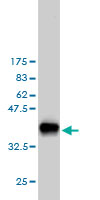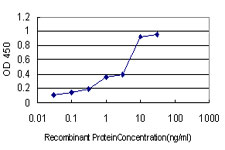PIN1 Antibody (monoclonal) (M02)
Mouse monoclonal antibody raised against a partial recombinant PIN1.
- 产品详情
- 实验流程
- 背景知识
Application
| WB, E |
|---|---|
| Primary Accession | Q13526 |
| Other Accession | BC002899 |
| Reactivity | Human |
| Host | mouse |
| Clonality | monoclonal |
| Isotype | IgG1 kappa |
| Clone Names | 5A8 |
| Calculated MW | 18243 Da |
| Gene ID | 5300 |
|---|---|
| Other Names | Peptidyl-prolyl cis-trans isomerase NIMA-interacting 1, Peptidyl-prolyl cis-trans isomerase Pin1, PPIase Pin1, Rotamase Pin1, PIN1 |
| Target/Specificity | PIN1 (AAH02899, 64 a.a. ~ 163 a.a) partial recombinant protein with GST tag. MW of the GST tag alone is 26 KDa. |
| Dilution | WB~~1:500~1000 E~~N/A |
| Format | Clear, colorless solution in phosphate buffered saline, pH 7.2 . |
| Storage | Store at -20°C or lower. Aliquot to avoid repeated freezing and thawing. |
| Precautions | PIN1 Antibody (monoclonal) (M02) is for research use only and not for use in diagnostic or therapeutic procedures. |
For Research Use Only. Not For Use In Diagnostic Procedures.
Provided below are standard protocols that you may find useful for product applications.
BACKGROUND
Peptidyl-prolyl cis/trans isomerases (PPIases; EC 5.2.1.8), such as PIN1, catalyze the cis/trans isomerization of peptidyl-prolyl peptide bonds. PIN1 is the only PPIase that specifically binds to phosphorylated ser/thr-pro motifs to catalytically regulate the post-phosphorylation conformation of its substrates. PIN1-catalyzed conformational regulation has a profound impact on key proteins involved in the regulation of cell growth, genotoxic and other stress responses, the immune response, germ cell development, neuronal differentiation, and survival (review by Lu and Zhou, 2007 [PubMed 17878917]).
REFERENCES
A PIN1 polymorphism that prevents its suppression by AP4 associates with delayed onset of Alzheimer's disease. Ma SL, et al. Neurobiol Aging, 2010 Jun 24. PMID 20580132.Uncoating of human immunodeficiency virus type 1 requires prolyl isomerase Pin1. Misumi S, et al. J Biol Chem, 2010 Aug 13. PMID 20529865.The prolyl isomerase Pin1 induces LC-3 expression and mediates tamoxifen resistance in breast cancer. Namgoong GM, et al. J Biol Chem, 2010 Jul 30. PMID 20479004.Elevated PIN1 expression by C/EBPalpha-p30 blocks C/EBPalpha-induced granulocytic differentiation through c-Jun in AML. Pulikkan JA, et al. Leukemia, 2010 May. PMID 20376080.Membrane permeable cyclic peptidyl inhibitors against human Peptidylprolyl Isomerase Pin1. Liu T, et al. J Med Chem, 2010 Mar 25. PMID 20180533.
终于等到您。ABCEPTA(百远生物)抗体产品。
点击下方“我要评价 ”按钮提交您的反馈信息,您的反馈和评价是我们最宝贵的财富之一,
我们将在1-3个工作日内处理您的反馈信息。
如有疑问,联系:0512-88856768 tech-china@abcepta.com.























 癌症的基本特征包括细胞增殖、血管生成、迁移、凋亡逃避机制和细胞永生等。找到癌症发生过程中这些通路的关键标记物和对应的抗体用于检测至关重要。
癌症的基本特征包括细胞增殖、血管生成、迁移、凋亡逃避机制和细胞永生等。找到癌症发生过程中这些通路的关键标记物和对应的抗体用于检测至关重要。 为您推荐一个泛素化位点预测神器——泛素化分析工具,可以为您的蛋白的泛素化位点作出预测和评分。
为您推荐一个泛素化位点预测神器——泛素化分析工具,可以为您的蛋白的泛素化位点作出预测和评分。 细胞自噬受体图形绘图工具为你的蛋白的细胞受体结合位点作出预测和评分,识别结合到自噬通路中的蛋白是非常重要的,便于让我们理解自噬在正常生理、病理过程中的作用,如发育、细胞分化、神经退化性疾病、压力条件下、感染和癌症。
细胞自噬受体图形绘图工具为你的蛋白的细胞受体结合位点作出预测和评分,识别结合到自噬通路中的蛋白是非常重要的,便于让我们理解自噬在正常生理、病理过程中的作用,如发育、细胞分化、神经退化性疾病、压力条件下、感染和癌症。







